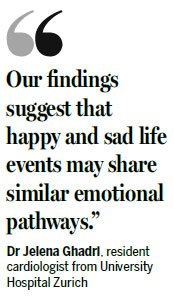Happiness can break your heart, doctors warn
"A patient is no longer the classic "broken hearted" patient, and the disease can be preceded by positive emotions too.

"Clinicians should be aware of this and also consider that patients who arrive in the emergency department with signs of heart attacks, such as chest pain and breathlessness, but after a happy event or emotion, could be suffering just as much as a similar patient presenting after a negative emotional event.
"Our findings suggest that happy and sad life events may share similar emotional pathways."
The condition is characterised by a sudden temporary weakening of the heart muscles which causes the left chamber of the heart to blow up like a balloon. It creates the shape of a Japanese octopus trap, which is why it's clinical name is takotsubo syndrome.
The problem mostly affects women. 95 per cent of all patients in the database are female with an average age of 65.
Dr Christian Templin, principle investigator from University Hospital Zurich, said further research was needed to understand the exact mechanisms underlying both the "broken" and "happy" heart variants.
"We believe that broken heart syndrome is a classic example of an intertwined feedback mechanism, involving the psychological and, or physical stimuli, the brain and the cardiovascular system.
"Perhaps both happy and sad life events, while inherently distinct, share final common pathways in the central nervous system output, which ultimately lead to broken heart syndrome."
The new findings were published in the European Heart Journal.
















